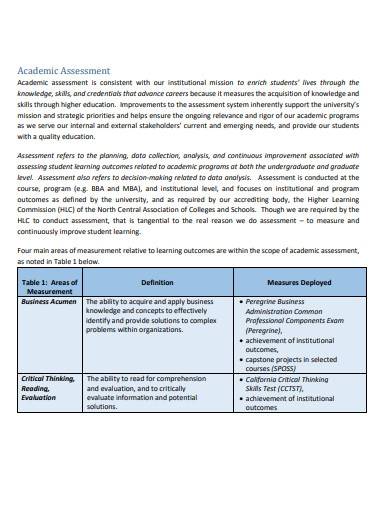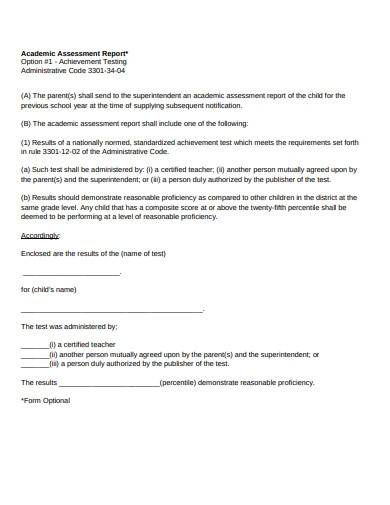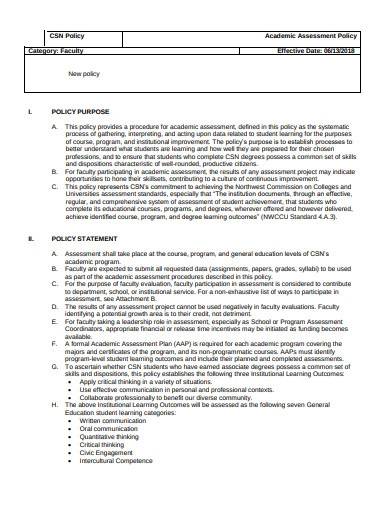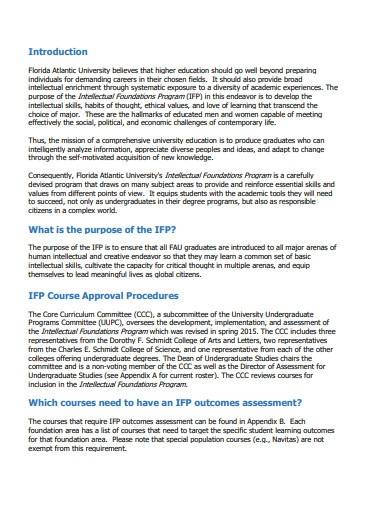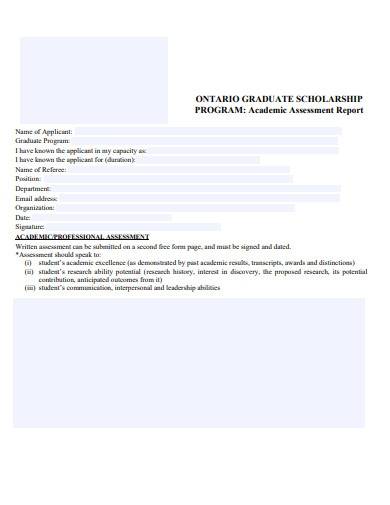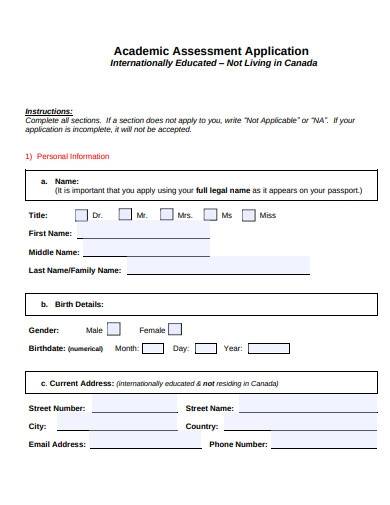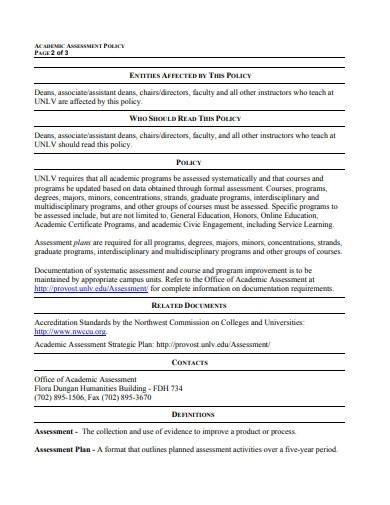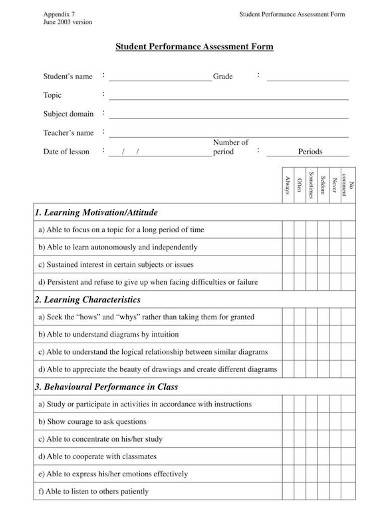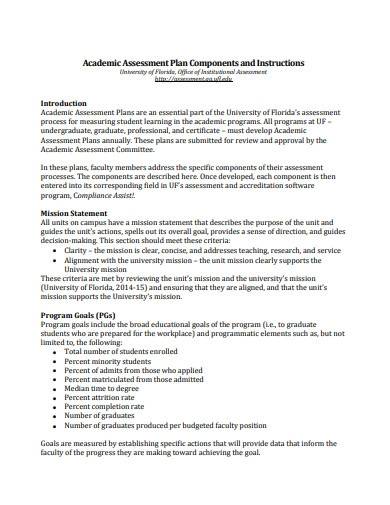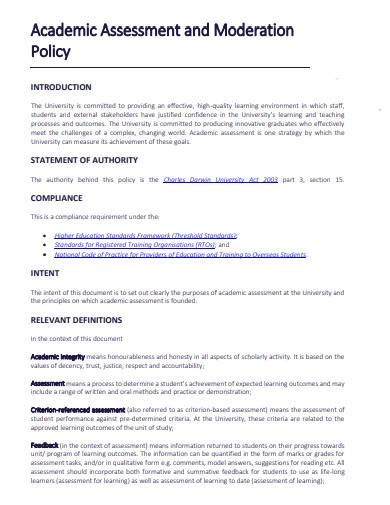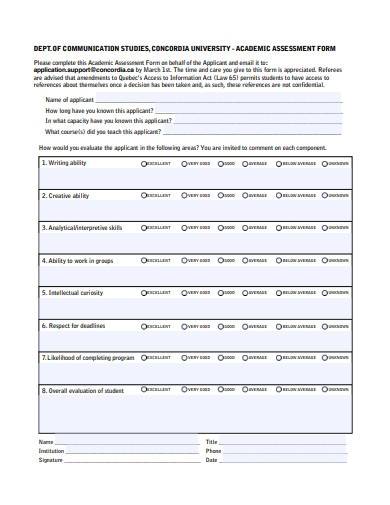A student’s academic performance can be evaluated in a variety of ways, including through formal examinations and quizzes, participation and attendance sheet in the classroom, project work and assignments, and performance evaluations such as presentations and demonstrations. While some tests are intended to gauge a student’s broad comprehension of a topic, others are more laser-focused on evaluating a student’s unique abilities or areas of expertise.
FREE 10+ Academic Assessment Samples & Templates
1. Academic Assessment Template
2. Sample Academic Assessment Report
3. Academic Assessment Policy Template
4. Academic Assessment Overview Sample
5. Academic Assessment Report Template
6. Academic Assessment Application Sample
7. Simple Academic Assessment Policy
8. Student Performance Assessment Form
9. Sample Academic Assessment Plan
10. Academic Assessment and Moderation Policy
11. Basic Academic Assessment Form
What Is an Academic Assessment?
Academic assessment is an integral part of the educational process, serving as a way to evaluate students’ knowledge, skills, and abilities in relation to a specific subject or academic course of study. By using various methods of assessment, teachers and educators are able to gauge the effectiveness of their instruction and identify areas where students may need additional support or guidance.
How To Make an Academic Assessment?
Academic assessment can be used to inform instruction and help high school or elementary teachers adjust their teaching methods to better meet the needs of their students. It can also be used to identify areas of strength and weakness in a student’s learning. There are several steps you can follow to create an effective academic assessment:
Step 1- Determine the Purpose
The first step in creating an academic assessment is identifying the specific sample objectives you want to assess. This will help you determine the most appropriate assessment type and ensure that the assessment aligns with your instructional goals.
Step 2- Choose a Format
There are many different formats that can be used for academic assessment, including exams, quizzes, projects, assignments, and performance assessments. Choose the most suitable design for the learning objectives you are trying to assess.
Step 3- Develop the Assessment
Once you have chosen the format for the assessment, you will need to create the actual assessment materials. This may involve writing questions or prompts, designing hands-on activities, or building performance tasks.
Step 4- Administer the Assessment
Once the assessment is complete, you must administer it to your students. This may involve distributing materials, providing instructions, and ensuring students have the necessary resources and support to complete the assessment.
What are the types of academic assessment?
There are many different types of academic assessment, including formal exams and quizzes, class participation and attendance, projects and assignments, and performance assessments such as presentations or demonstrations.
How is academic assessment used to inform instruction?
The results of academic assessment can be used to inform instruction and help teachers adjust their teaching methods to better meet the needs of their students. It can also be used to identify areas of strength and weakness in a student’s learning, and to guide decisions about grades and academic advancement.
How can I create an effective academic assessment?
To create an effective academic assessment, you should first determine the purpose of the assessment, choose an appropriate format, develop the assessment materials, administer the assessment to your students, evaluate and grade the results, and use the results to inform your instruction.
The process of evaluating a student’s knowledge, skills, and abilities in connection to a particular field of study or curriculum is referred to as academic assessment. It is an essential component of the learning process because it enables teachers and other educators to evaluate how effectively students are learning and advancing, as well as to identify areas in which students might want further support or guidance.
Related Posts
FREE 6+ Sample Interview Assessment Forms in PDF MS Word
FREE 9+ Sample Project Risk Assessment Templates in PDF MS ...
FREE 11+ Sample Self-Assessment Examples in PDF Excel | MS ...
FREE 9+ Sample Self Assessment Forms in PDF Word | Excel
FREE 9+ Sample Students Feedback Forms in PDF MS Word
FREE 7+ Sample Psychologist Job Descriptions in PDF
FREE 14+ Academic Calendar Templates in MS Word Pages ...
FREE 8+ Self Assessment Samples in Excel PDF | MS Word
FREE 9+ Self Appraisal Templates in PDF MS Word
FREE 6+ Sample Academic Advisor Cover Letter Templates in PDF ...
FREE 13+ Sample Training Needs Assessment Templates in PDF ...
FREE 7+ Sample Teacher Self-Evaluation Forms in MS Word PDF
FREE 35+ Risk Assessment Form Samples in PDF MS Word
FREE 7+ Sample Tutor Resume Templates in PDF Word
FREE 7+ Sample Health Assessments in PDF MS Word

